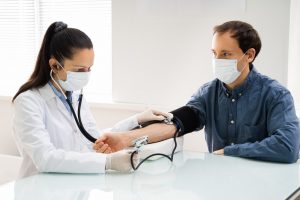 If you’ve been working to naturally lower your blood pressure for the past six months with little success, the American Heart Association recommends a new approach: medication.
If you’ve been working to naturally lower your blood pressure for the past six months with little success, the American Heart Association recommends a new approach: medication.
They aren’t suggesting that medication should replace the measures you’re taking, but rather making it a part of your treatment plan to reduce long-term health risks.
Advertisement
The recommendation updates guidelines established in 2017 and specifically targets people with untreated stage 1 high blood pressure. Stage 1 high blood pressure is defined as a reading of 130/80-89 mm Hg and is generally first treated through lifestyle measures.
People in this range are considered to have a low risk of heart attack or stroke within the next 10 years. Low risk is considered less than 10 percent.
There could be various reasons why lifestyle efforts aren’t dropping blood pressure as you may expect. One could have to do with genetics. It’s possible that you could have a predisposition to higher blood pressure.
Another is that you may be overestimating your efforts. For example, perhaps you’re not exercising as hard or as often as you think, or are canceling out the occasional healthy meal with increased intake of processed foods, snacks, or alcohol.
It is not uncommon for a person to “reward” themselves for healthy choices with unhealthy ones. When done disproportionately, benefits can be easily erased.
The importance of reducing stage 1 blood pressure is to protect yourself from the effects of long-term health problems that can arise. Unchecked blood pressure can lead to organ damage and boost your risk for a severe health outcome.
Advertisement
To give yourself the best chance at lowering blood pressure, try your best to eat a diet high in fruits and vegetables-something that resembles the Mediterranean diet. Exercise, weight loss, and monitoring sodium and potassium intake is also recommended (more potassium and less sodium).
You can keep track of progress by checking your blood pressure every day and paying attention to week-over-week progress. If things aren’t moving in the right direction after six months, talk to your doctor about medical treatment options.
The new recommendations were published in Hypertension, a journal of the American Heart Association.
